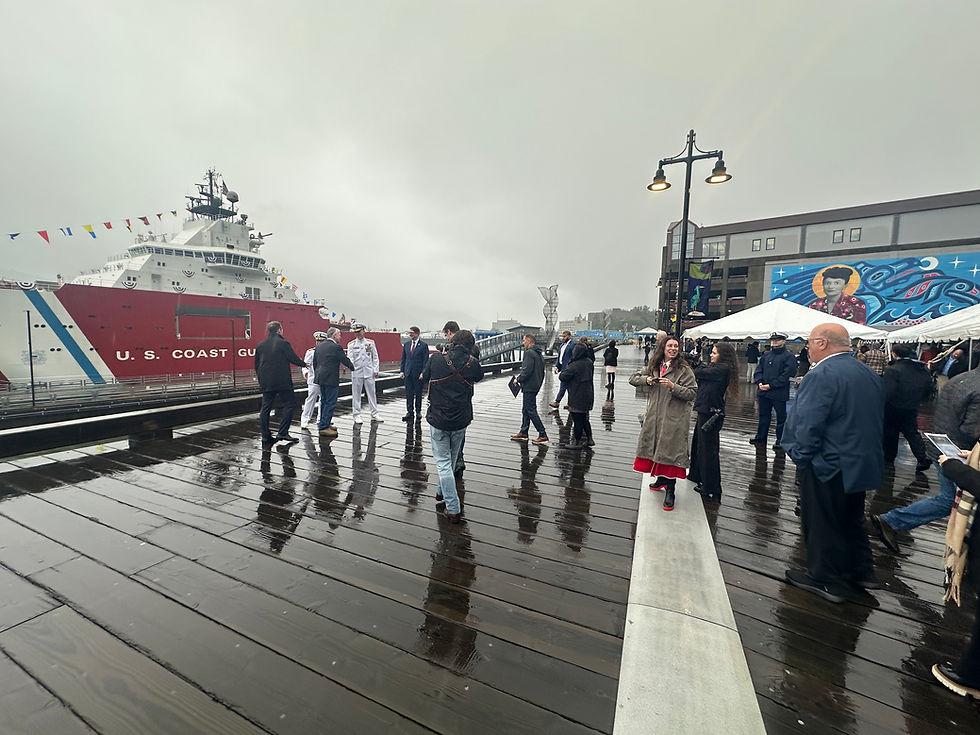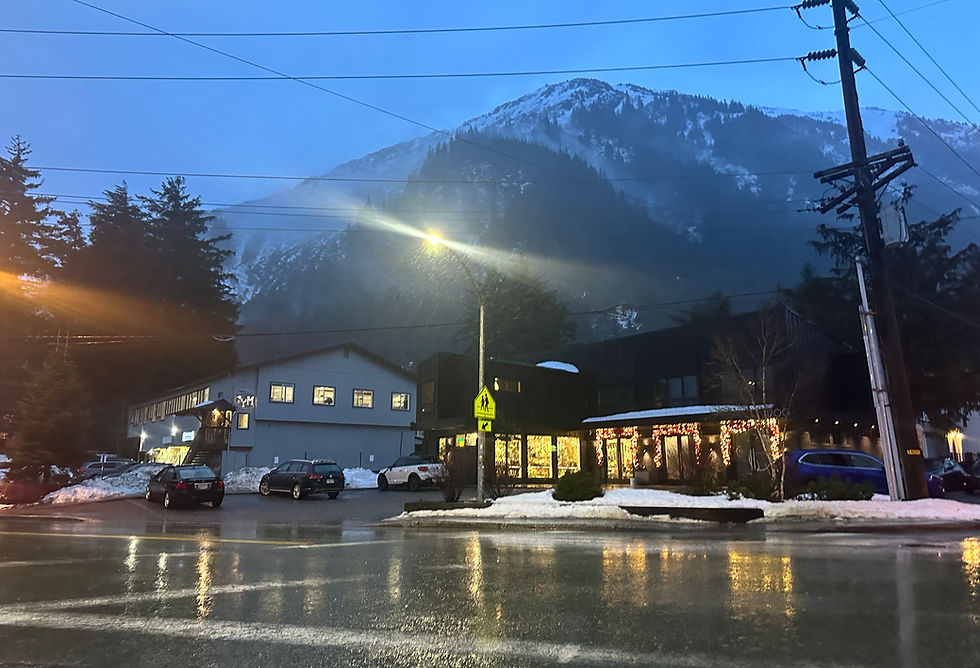Storis hailed as launch of a new era for Juneau and the Coast Guard during commissioning ceremony
- Mark Sabbatini

- Aug 10, 2025
- 6 min read
First "new" icebreaker in fleet in 25 years signifies commitment for many more vessels in coming years, USCG’s new commandant says

By Mark Sabbatini
Juneau Independent
After a years-long and politically perilous journey to Juneau, the true voyage of the U.S. Coast Guard’s second Storis icebreaker is officially underway.
The 360-foot-long repurposed and repainted ship, originally built in 2012 as an oil service vessel, was commissioned for Coast Guard service Sunday during a rainy ceremony at Elizabeth Peratrvich Plaza. Adm. Kevin Lunday, the Coast Guard’s acting commandant, headed a list of top dignitaries that included two members of Alaska’s congressional delegation and Deputy Secretary of Homeland Security Troy Edgar.
"Storis adds vital capability to the U.S. polarized fleet at a critical time when our adversaries are expanding their activities in and near U.S. waters, and the challenges and threats we face as a nation are growing more complex every day," Lunday told the invitation-only crowd of about 200 people under a large canapy tent, along with the initial crew of the ship standing at ease under a smaller tent to the side.

The Storis, which arrived in Juneau on Wednesday, is set to be homeported here when it is fully upgraded to perform its intended Coast Guard duties and support shore infrastructure for the ship is completed. Officials have stated that work will likely take several years and the Storis will patrol in Alaska seasonally during warmer months and spend its winters in Seattle in the meantime.
The stationing of crew members and their families is expected to add hundreds of people to Juneau’s population when the Storis is fully ready, and $300 million in a recently signed federal budget bill is targeted for shore facilities, according to Coast Guard and congressional leaders. That made the Storis’ arrival greatly anticipated by Juneau’s leaders and residents, with about 800 people — more than crew planned for — showing up for public tours during limited hours on Thursday and Friday.
Deputy Mayor Greg Smith, as one of the first speakers at Sunday’s commissioning ceremony, unveiled a posterboard announcing Juneau’s status as an officially designated U.S. Coast Guard City as of April 13.
"It's a tremendous honor, a tremendous privilege, but also a tremendous responsibility for us to make sure that we are the best homeport city that we can be for the Storis," he said. "Thankfully, Juneau’s priorities are priorities of the Coast Guard: robust infrastructure, affordable housing, available child care, excellent health care and great schools. And we have made a lot of investments in those areas to make sure we provide great services to our community as well as our Coast Guard families. But with the homeporting the Storis that just ups it to the next level."

The Storis began its life as the Aiviq, a private service vessel with a troubled history due in part to what experts called design flaws such as an easily-swamped rear deck that resulted in additional problems with mechanical and electrical equipment. Efforts to sell or lease the ship early during its life were made by Edison Chouest, the company that owned it, and it found willing buyers among some members of Congress (some of whom received donations from the company).
Coast Guard leaders initially resisted the purchase, with then-Adm. Charles Michel telling U.S. Rep. Don Young, R-Alaska, in 2016, “that vessel is not suitable for military service without substantial refit.”
But members of Alaska’s congressional delegation kept up their aggressive efforts — with Sullivan noting during the ceremony he held up promotions of Coast Guard officials until a study on homeporting an icebreaker in Alaska was undertaken — and the purchase of the Aiviq for $125 million occurred late last year.
Lunday, speaking to reporters after the commissioning ceremony, said that despite the reservations expressed by predecessors the Storis "is ready for Coast Guard service."
"We've learned a lot since then and we've had great support from Congress to have the appropriations necessary last year to purchase the ship," he said. "And then we took a different approach. We partnered with industry. We've teamed with industry that knows how to operate the ship, the ones we purchased it from, and so that's enabled us to move much faster than we would have traditionally done."

The ship set out for its maiden voyage as the Storis in early June from Pascagoula, Mississippi, with an initial crew of more than 40 Coast Guard personnel and more than 20 from Edison Chouest to help the enlistees become familiar with the vessel.
One aspect of the initial voyage and hybrid crew is learning the Storis’ abilities and limitations in fulfilling Coast Guard missions in Alaska ranging from law enforcement to confrontations with foreign-flag vessels to search-and-rescue operations in extreme weather. Congressional members and Coast Guard officers agree the Storis doesn’t have the capabilities of newly built Polar Security Cutters that have been sought since 2018, but as of now may not see the first built until at least 2030.
(Official U.S. Coast Guard video of commissioning ceremony)
Lunday said the years of waiting for the first of what are hoped to be three heavy icebreakers is among the reasons it's important to build out the overall icebreaker fleet. He and other officials have stated Russia has a fleet of about 50 icebreakers and other countries such as China are also surpassing the U.S.
"When we see the adversaries, potential adversaries, that are moving to build their icebreakers, we've got to move faster as the United States and we're going to do that," he said. "And Storis enables us to do that very quickly. The original plan was not to have Storis up here for another year, but the national imperative was to move faster. So that's why it's here this summer."
Sullivan, answering questions from reporters alongside Lunday, denied the political contributions made by Edison Chouest were a factor in the aggressive efforts to convert the Aiviq to the Storis.
"I've been pressing for more icebreakers any way possible for our country," he said, adding the Coast Guard initiated the idea of looking for a commercially available icebreaker — although those efforts included looking at foreign vessels as well as the U.S.-built Aiviq.

The federal spending bill passed last month contains funding for 17 icebreakers and 21 cutters — far more than the Coast Guard was seeking until President Donald Trump after he began his second term this year announced he wanted a 40-icebreaker fleet. Lunday said he hopes two additional heavy icebreakers will be ready at two-year intervals after the first is completed, and that medium-duty cutters will be ready for duty before 2030.
U.S. Sen. Lisa Murkowski, R-Alaska — who toured the Storis on Friday, but was absent from Sunday’s ceremony — said one way the Coast Guard will acquire new ships is through partnerships with foreign builders such as companies in Finland and Canada. Sullivan, on Sunday, said a difference now versus the delays earlier is "we have historic funding to do all this."
Sunday’s commissioning was full of celebratory and ceremonial moments, including Dawn Vallely — daughter of the late Congressman Young — presenting Coast Guard Lt. j.g. Sofia Scott with a long glass to mark the setting of the first watch near the end of the event. Moments later Scott and the rest of the crew were directed back to their duties aboard the awaiting ship.
"I can tell you that we're excited," said Capt. Corey Kerns, commanding officer of the Storis, addressing Lunday and the enlistees. "The crew is excited. This is such a unique opportunity and we're ready, sir. Coast Guard Cutter Storis, it's time to earn our sea stories. Let's take this billowing beast to the Arctic."
• Contact Mark Sabbatini at editor@juneauindependent.com or (907) 957-2306.













